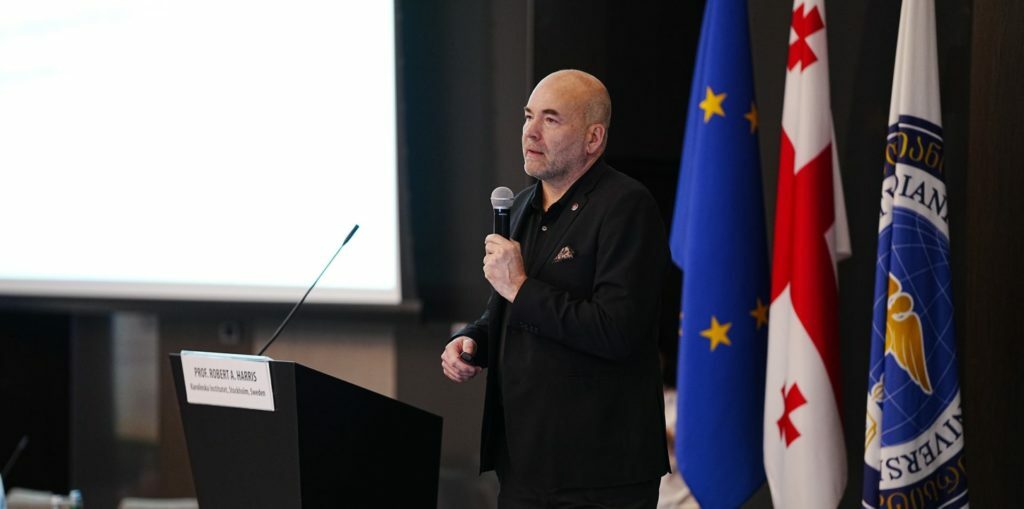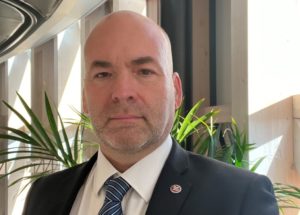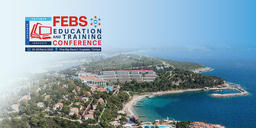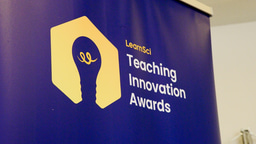Meet Robert Harris, the FEBS Education Award 2024 winner

On its 60th anniversary year, FEBS has launched the prestigious FEBS Education Award to highlight and honour an educator with a distinguished teaching and training career path in the field of molecular life sciences. The award also aims to inspire others in fostering engaging, creative and transformative educational experiences for students. Exemplary dedication to enhance the quality of student learning and experience along with a track record of applying impactful and innovative approaches in advancing learning and teaching within the realm of molecular life sciences are the main pillars. The selection of the awardees is made from nominations from or supported by the FEBS Constituent Societies.
FEBS recently announced the inaugural recipient of the FEBS Education Award is Prof. Robert A. Harris, nominated by the Swedish Society for Biochemistry, Biophysics & Molecular Biology (SSBBMB). Read the full 2024 prize announcement on the FEBS website here. Prof. Harris will be congratulated on the award at the upcoming 48th FEBS Congress in Milano.
 Born and educated in the UK, Robert Harris carried out his PhD at University College London in the field of parasitology. He moved to the Karolinska Institutet in Stockholm, Sweden in 1994, and became Professor of Immunotherapy in Neurological diseases there in 2013. He leads a research group focusing on immunotherapy in ALS, Alzheimer’s disease and multiple sclerosis. He is currently Academic Vice President of Doctoral Education and is a former head of the International Council at the Karolinska Institutet. He is also a former President of the international doctoral education organization ORPHEUS (‘The Organisation for PhD Education in Biomedicine and Health Sciences in the European System’).
Born and educated in the UK, Robert Harris carried out his PhD at University College London in the field of parasitology. He moved to the Karolinska Institutet in Stockholm, Sweden in 1994, and became Professor of Immunotherapy in Neurological diseases there in 2013. He leads a research group focusing on immunotherapy in ALS, Alzheimer’s disease and multiple sclerosis. He is currently Academic Vice President of Doctoral Education and is a former head of the International Council at the Karolinska Institutet. He is also a former President of the international doctoral education organization ORPHEUS (‘The Organisation for PhD Education in Biomedicine and Health Sciences in the European System’).
When and why did you get so interested in education and training?
I have always had an interest in inspiring others how to improve their knowledge, and have a natural storytelling ability that has certainly helped me establish a reputation as someone worth listening to. I did not have the best time myself as a PhD student, and that has made me more interested in improving the experience for others.
How do you juggle a role as a researcher and educator and administrator?
The roles of researcher, educator and administrator complement each other very well in my opinion. These are the three basic pillars of a university, so becoming knowledgeable in all three aspects makes me credible to people within each of these three factions. Credibility is critical if you wish to improve people’s mindset.
We learned that you introduced exit polls for PhD students and a 'green light' system for the PhD supervisor role at the Karolinska Institutet. Can you tell us a bit more about this and the impact they have had on PhD delivery?
I got frustrated hearing the rector always talking about the institute’s great reputation, without there being any solid data to prove that – as a scientist I need data! The Exit Poll has given us the possibility to generate that data, and to use it to make improvements. We initiated an Introductory course for PhD students based on the Exit Poll feedback. By collating data over almost 20 years we are also able to see what impact the various improvements have had over time, as we can see trends of improvements that relate to the innovations we have made.
The Green Light system has introduced a consequence for any supervisor not performing as well as they should be, so the general response has been for most people to see the need for self-improvement. In addition, some of our poor-performing supervisors are dissuaded from taking on new PhD students by this system. The impact of the Green Light has therefore been to raise the standard and expectation of PhD supervision.
Some of the courses you have devised to improve PhD programs cover general people management skills such as giving feedback and conflict resolution. How does the involvement of a scientist in the course design and delivery help their effectiveness?
Again, legitimacy is the key. I can contextualize these leadership skills in real-life research situations, so that the course attendees understand that I know what I am talking about.
Is a good PhD supervisor born or made?
Both. Some have natural caring and leadership abilities. Others can be taught these. Or rather, they can be inspired how to self-develop.
What would you say is the biggest change in doctoral training (or student/supervisor expectations) over the past 25 years?
Compulsory supervisor training – which is now quite widespread but still not in every country.
What still has to be improved in doctoral training?
Many countries still lack funding for PhD students, who therefore have to be economically self-sufficient. Many countries still focus almost entirely on the research production (publications) rather than on the journey the PhD student takes (the learning experience). The expectations of what can be achieved in the research project need to be modernized regarding the maximum time available and the expectations of publishing top-quality research. These are ever-changing aspects that need constant calibration.
You served as President of ORPHEUS for many years. What developments at the organization would you pick out as particularly valuable from this time?
During my Presidency we redeveloped our ‘Standards of Doctoral Education’ into a ‘Best Practices in Doctoral Education’ which has had a great impact in helping doctoral schools develop their programs. The increased flexibility and clearly distinct levels of complexity of the Best Practices is considered to be more appealing and achievable than the previous ‘do-as-I-say’ Standards version.
What do you most enjoy among your many inputs and roles in the education and training field?
Meeting new people all around the world from different academic and social cultures, and having new discussions about old core subjects within doctoral education. I am always learning something new through these interactions, and that enriches my experience.
Top image of post: Robert Harris in action.





Join the FEBS Network today
Joining the FEBS Network’s molecular life sciences community enables you to access special content on the site, present your profile, 'follow' contributors, 'comment' on and 'like' content, post your own content, and set up a tailored email digest for updates.